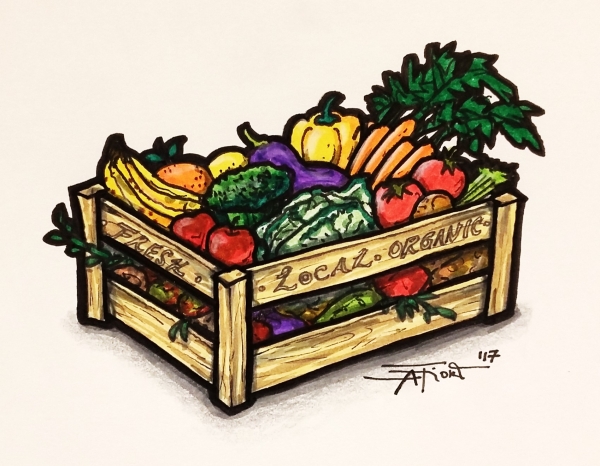What people refer to when they talk about organic food has become a point of contention. Technically, the term “organic” refers to a food item that is grown according to certain Canadian Food Inspection Agency (CFIA) standards; culturally, it is more expansive. To some people, going “organic” signifies leading a more ethical lifestyle. To others, it is an example of the financial inaccessibility of eco-friendly consumption. Whatever one’s thoughts are on eating organically, to consider eating as an act of consumption–both economically and physically—is not conducive to an environmentally conscious diet. It alienates the individual from the conditions under which the food was produced. To eat in a way that is environmentally responsible, it is necessary to alter one’s mindset surrounding food.
One must view eating as participation in an ecosystem, rather than a disjointed transaction, and make dietary choices accordingly. This means that there is no blanket fix, such as eating exclusively organic or local produce. Instead, the solution lies in small actions, each one approaching an affirmative answer to the question, “Are my eating choices in harmony with the ecosystem that produces my food?”
Marketplace signifiers such as “organic” might seem to indicate a more ethical choice, but this can be misleading. Organic food, firstly, is financially inaccessible to those who cannot participate in the consumer class. It is also a niche market–a subset of the food industry that only targets a specific population–and therefore does not have the capacity to affect change across all demographics. Eating organic is only one potential component of maintaining a conscientious and informed relationship with food.
To achieve this goal, one must be conscious of the consequences of consumption. For example, every meal has a carbon footprint, and it is the responsibility of the individual to mitigate the unnecessary expenditure of energy. Eating local is the most obvious way to be conscious of this, but other factors also come into play. It is more beneficial to eat seasonal foods or preserved foods than, say, fresh berries in January. The idea of going to the grocery store and purchasing whatever you like, at any time, is dangerous because it necessitates the unnecessary expenditure of energy to make sure that food is available out of season. Out of season food must be shipped hundreds or thousands of miles, wasting fuel. This is the epitome of viewing food as a consumer good, instead of a varied and cyclical subset of the natural environment.
Another element to consider is the scale at which a food item is produced. For example, at its current scale, the beef industry is wasteful and destructive, an active threat to the global ecosystem. The production of four ounces of mass-produced beef creates the same amount of greenhouse gas emissions as driving six and a half miles. This does not mean that cattle production as a whole is a horrible thing. Rather, it is the eater’s responsibility is to help shift the food culture from one that is absurdly meat-heavy to one in which meat is consumed more sparingly.
Finally, it is necessary to consider the livelihood of human beings. People too are a part of the biotic community. This is where eating organic produce may actually be of value, as certain pesticides are proven to have a connection with illnesses in farmworkers. Empathy for the people who produce the food one buys is the final link in the chain of compassionate eating.
The goals of a food production company are not always analogous to the goals of the environmentally-conscious eater. Likewise, the words “organic” or “local” do not necessarily indicate the most environmentally-conscious choice. It is only by reframing society’s perspective on food as a consumer good that one can enact legitimate change.








